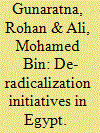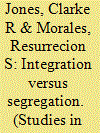|
|
|
Sort Order |
|
|
|
Items / Page
|
|
|
|
|
|
|
| Srl | Item |
| 1 |
ID:
105991


|
|
|
|
|
| Publication |
2011.
|
| Summary/Abstract |
Recently many scholars have focused their attention on the dynamics of radicalization, de-radicalization, and disengagement, yet most studies are based on indirect and/or data which is difficult to verify. An exception comes from Italy, where authorities have recently benefited from the insights of two former members of an al Qaeda-affiliated Tunisian network. The two have voluntarily described to authorities the process and factors that led them to their radicalization and encouraged them to abondon the network. Based on thousands of pages of their unpublished confessions, the article provides a case study of radicalization that is rich in detail and uniquely reliable.
|
|
|
|
|
|
|
|
|
|
|
|
|
|
|
|
| 2 |
ID:
087840


|
|
|
|
|
| Publication |
2009.
|
| Summary/Abstract |
This article provides a preliminary insight to the ideological revision of the two principle Islamist militant groups in Egypt, the Al-Gamaa Al-Islamiyya and Al-Jihad Al-Islami. Several leaders of these groups have taken steps to renounce violence and promote peace co-existence with the government and society. They have also repented and apologized for the past terror attacks in Egypt that led to the killing of many innocent civilians, government officials and tourists. In addition, they have gone to great lengths to counter and argue against Al Qaeda's violent ideology and to restrict its influence on the Muslim population. The ideological revision of these two groups reflects a significant shift in the efforts of the Egyptian authorities and community to address the problem of ideological extremism and terrorism in the country.
|
|
|
|
|
|
|
|
|
|
|
|
|
|
|
|
| 3 |
ID:
110854


|
|
|
|
|
| Publication |
2012.
|
| Summary/Abstract |
Operations to counterterrorism in the southern Philippines have resulted in the arrest and incarceration of a significant number of key militants. As a result, the Philippine government has expressed concern that these inmates may radicalize others and continue to operate while incarcerated. As a preventive measure, the government has considered a number of "soft" counterstrategies, including the development of a de-radicalization program. To study the feasibility of running such a program in the Philippine corrective system, this article examines two interrelated areas of enquiry concerning how terrorist inmates are housed and whether prison gangs foster or discourage radicalization in the Philippine prison system. Initial findings suggest that the integration of terrorist inmates with prison gangs may temporarily encourage disengagement and set the foundations for de-radicalization. However, without a specifically designed intervention strategy, the terrorist inmates may revert to militancy once they have returned to their original social settings.
|
|
|
|
|
|
|
|
|
|
|
|
|
|
|
|
| 4 |
ID:
105990


|
|
|
|
|
| Publication |
2011.
|
| Summary/Abstract |
This article analyzes the global transformations of jihadist movements towards abandoning and de-legitimizing political violence in general and terrorism in particular. It focuses on the de-radicalization process of Libya's largest armed Islamist movement: the Islamic Fighting Group. It analyzes the causes behind those transformations and outlines the necessary conditions for, and policy implications of, successful de-radicalization. The article is mainly based on primary sources, field work, and interviews with former jihadist leaders, mid-ranking commanders, grassroots activists, security and intelligence officers, and state officials.
|
|
|
|
|
|
|
|
|
|
|
|
|
|
|
|
| 5 |
ID:
095296


|
|
|
|
|
| Publication |
2010.
|
| Summary/Abstract |
Renewed interest on how and why terrorism ends has emerged in parallel with increased visibility of some new and innovative approaches to counterterrorism. These are collectively known, whether for good or bad, as "de-radicalization programs." However, and despite their popularity, data surrounding even the most basic of facts about these programs remains limited. This article presents an overview of the results of a one-year pilot study of select de-radicalization programs and investigates critical issues surrounding assessment of their effectiveness and outcomes. We argue that Multi Attribute Utility Technology (MAUT) may offer promise for future empirical assessment of what we prefer to designate "terrorism risk reduction initiatives." Perhaps less obviously, and until more data surrounding the efficacy of such initiatives becomes available, MAUT may also provide a conceptual basis for planning, evaluating, and guiding the development of future such initiatives and may have the unanticipated consequence of facilitating progress by encouraging greater exploration of efforts to change behavior from other contexts.
|
|
|
|
|
|
|
|
|
|
|
|
|
|
|
|
| 6 |
ID:
172190


|
|
|
|
|
| Summary/Abstract |
The use of specialised prison units (SPUs) as a means of countering violent extremism and radicalisation is growing in popularity in many jurisdictions. Yet, little is known about their ability to prevent radicalisation in the long term, limit the spread of violent extremism, or promote de-radicalisation and disengagement. This paper begins to explore these issues by reflecting on the over 40 years of experience that Northern Ireland (NI) has had in this area. It is argued that the international community tends to have an incomplete understanding of: a) why SPUs were created and installed in NI; b) how their regime, conditions, and underlying rationale changed over time; and c) the long-term consequences that SPUs have had on the spread of violent extremism, de-radicalisation, and disengagement. This paper seeks to make an original contribution to this literature by highlighting the role psychological, situational, social, and political factors played in shaping the effectiveness of SPUs in NI. By providing a more in-depth analysis of why SPUs in NI entrenched extremism rather than promoted disengagement or de-radicalisation, other jurisdictions will be encouraged to reflect on how these factors may affect the success of their own SPUs in countering violent extremism.
|
|
|
|
|
|
|
|
|
|
|
|
|
|
|
|
|
|
|
|
|